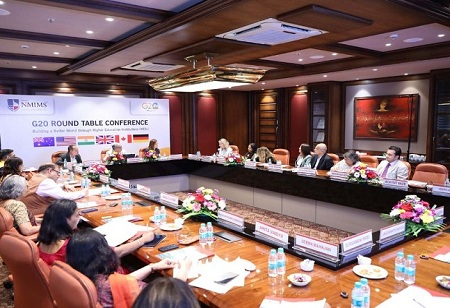-
The G20 Round Table Conference was held by NMIMS Deemed-to-be University, marking a watershed moment in fostering worldwide collaboration of HEIs in crafting a sustainable and better future. The goal was to clarify concepts for encouraging international involvement among HEIs in order to provide excellent education, reduce global inequities, and enable students to address global concerns in order to create a more sustainable world. This program preceded the G20 conference in September, laying the groundwork for substantive conversations. The meeting brought together education-contributing countries such as Australia, the United Kingdom, Canada, Germany, the United States, and other countries. The primary goal was to investigate worldwide collaborations to encourage the sharing of ideas and best practices in improving HEI capacity in promoting quality education, providing students with information and skills to boost employability, and creating a sustainable future. Dr. Joanna Newman, Chief Executive and Secretary-General of ACU, was in attendance as the Chief Guest. Dr. Monica Kennedy, Senior Trade and Investment Commissioner, Austrade, Mumbai, India Dr. Prachi Kaul, Director of the Shastri Indo Canadian Institute (SICI), Mrs. Marja-Sirkka Einig, Deputy Consul General of the Federal Republic of Germany in Mumbai, Ms. Sita Raiter, Public Diplomacy Officer at the United States Consulate General in Mumbai, Dr. Ryan Pereira, Regional Officer at the United States-India Educational Foundation, and Ms. Rittika Chanda Parruck, Director of Education at the British Council enriched the discussion. Guests from other G20 countries, in particular, emphasized the event's worldwide significance.
The Commonwealth is a dynamic confederation of 54 member nations, the vast majority of which trace their roots to regions initially administered by the vast realm of the British Empire. These member countries span continents, including Africa, the Americas, Asia, Europe, and the Pacific, providing a tapestry of diversity and culture. The main aims of this organization are a tapestry of principles that link these nations together. This involves cultivating mutual understanding and building comprehension bridges across disparate realities. Among these goals, we see a dynamic interplay of expression styles that alternates between introspective elaboration and concise transmission. Vice Chancellor Dr. Ramesh Bhat, Pro VC Dr. Sharad Mhaiskar, Dr. Meena Galliara, Director, Jasani Center for Social Entrepreneurship & Sustainability Management, School of Business Management, Dr. Kaiwan Mehta, Dean, Balwant Sheth School of Architecture, and Ms. Meena Saxena, Director, International Linkages, as well as Deans and Directors from all schools, participated. The conference sought to investigate Higher Education Institutions (HEIs) as builders of an inclusive future in order to address global concerns such as climate change, geopolitical conflicts, and economic insecurity. HEIs have the ability to create transformation towards a more sustainable world through knowledge distribution, research, and skill development. The conference emphasized the role of HEIs in achieving SDG 4: inclusive, equitable, and affordable quality education, which is critical for economic growth and social development. The Round Table Conference's insights and action points to facilitate international engagement for strengthening HEI collaboration to achieve SDG 4 and address global challenges will be presented to the G20 presidency, UGC, and other key stakeholders. The event serves as a preview for a larger gathering next year, which will bring together South Asian academics to debate how to advance global higher education.
Dr. Ramesh Bhat, Vice Chancellor of SVKM's NMIMS, emphasized the importance of HEIs in addressing global concerns. "At the G20 Round Table Conference, discussions included advancing collaboration and partnerships among global higher education institutions," he stated. Deliberations focused on inclusion in education and learning initiatives, improving student exchange programs for increased mobility, and making foreign education more accessible to students in India and abroad. The discussion covered a wide range of essential topics, all of which will be methodically gathered into detailed reports, capturing useful insights and recommendations, and shared with all of our stakeholders. NMIMS University is honored to host this event, and we are dedicated to adopting the findings in order to form a better future for future generations." "Today, we talked about how international collaboration between universities can meet sustainable development goals," stated Dr. Joanna Newman, Chief Executive and secretary-general of ACU. We have over 500 universities in 50 nations in a network like the Association of Commonwealth Universities. It exemplifies how international cooperation may tackle global issues. We have the climate and resilience network, the peace and reconciliation network, and the sustainable development goals network, all of which include hundreds of academics from throughout the Commonwealth who are approaching the same issue from very different perspectives. When they get together, it's the diversity of experience that makes research collaborations effective, and because they come from diverse backgrounds yet have the same concerns, they come up with really great ideas about how to collaborate and solve global challenges".
🍪 Do you like Cookies?
We use cookies to ensure you get the best experience on our website. Read more...

